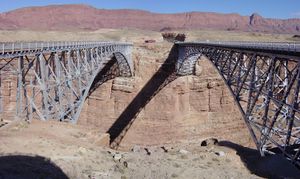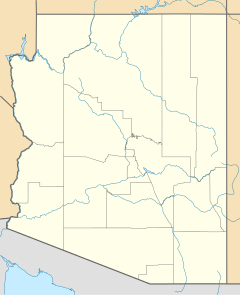Navajo Bridge
| Navajo Bridge | |
|---|---|

View to east with 1929 bridge at left, 1995 bridge at right
A portion of the Echo Cliffs is in the background. |
|
| Carries | US 89A |
| Crosses | Colorado River at Marble Canyon |
| Official name | Navajo Steel Arch Highway Bridge |
| Characteristics | |
| Design | spandrel arch bridge with 90 feet (27 m) rise (both) |
| Material | steel |
| Total length | 834 feet (254 m) 1st 909 feet (277 m) 2nd |
| Width | 18 feet (5.5 m) 1st 44 feet (13 m) 2nd |
| Longest span | 616 feet (188 m) 1st[1] 726 feet (221 m) 2nd |
| Number of spans | 1 |
| Piers in water | 0 |
| Clearance below | 464 feet (141.4 m) 1st 470 feet (143.3 m) 2nd |
| History | |
| Construction begin | 1927 (1st) 1994 (2nd)[2] |
| Construction end | 1929 (1st) 1995 (2nd)[2] |
| Opened | 1929-06-15 (1st) 1994-10-14 (2nd) |
|
Navajo Steel Arch Highway Bridge
|
|
| Nearest city | Page, Arizona |
| Coordinates | Lua error in package.lua at line 80: module 'strict' not found. |
| Built | 1927 |
| Architect | Arizona Highway Dept.; Et al. |
| Architectural style | Other |
| MPS | Vehicular Bridges in Arizona MPS |
| NRHP Reference # | 81000134[3] |
| Added to NRHP | August 13, 1981 |
Navajo Bridge crosses the Colorado River's Marble Canyon near Lee's Ferry in the US state of Arizona carrying U.S. Route 89A. Spanning Marble Canyon, the bridge carries northbound travelers to southern Utah and to the Arizona Strip, the otherwise inaccessible portion of Arizona north of the Colorado River, which includes the North Rim of Grand Canyon National Park.
Prior to the construction of the first Navajo Bridge, the only river crossing from Arizona to Utah was at nearby Lee's Ferry, where the canyon walls are low and getting vehicles onto the water is relatively convenient. The ferry offered only unreliable service, however, as adverse weather and flooding regularly prevented its operation.
History
Construction of the original Navajo Bridge began in 1927, and the bridge opened to traffic in 1929. It was paid for by the nascent Arizona State Highway Commission (now the Arizona Department of Transportation) in cooperation with the United States Department of the Interior's Bureau of Indian Affairs, as the eastern landing is on the Navajo Nation. The steel spandrel bridge design was constructed by the Kansas City Structural Steel Company. During construction, worker Lane McDaniel died after falling 470 feet (140 m) to the Colorado River below. Supervisors had rejected the idea of rigging safety netting, believing that it would catch on fire from falling hot rivets.[4]
The bridge is 834 feet (254 m) in length, with a maximum height of 467 feet (142 m) from the canyon floor. Its roadway offers an 18-foot (5.5 m) surface width with a load capacity of 22.5 tons (although the posted legal weight limit was 40 tons). During the design phase, a wider roadway was considered, but ultimately rejected, as it would have required a costly third arch to be added to the design, and the vehicles of the time did not necessitate the wider road.
In 1990, however, it was decided that the traffic flow was too great for the original bridge, and that a new solution was needed. The sharp corners in the roadway on each side of the bridge's approach had become a safety hazard due to low visibility, and the deficiency in the original design's width and load capacity specifications were becoming problematic. The bridge had also become part of U.S. Route 89A.
Deciding on a solution was difficult, due to the many local interests. Issues included preservation of sacred Navajo land, endangered plant species in Marble Canyon, and the possibility of construction pollution entering the river. The original proposal called for merely widening and fortifying the bridge, but this was ultimately rejected since this could not possibly bring it up to current federal highway standards. Replacement was then the only option, and it was eventually decided to entirely discontinue automobile use of the original bridge. A new bridge would be built immediately next to the original and have a considerably similar visual appearance, but would conform to modern highway codes.
The new steel arch bridge was commissioned by the Arizona Department of Transportation and the Federal Highway Administration, and was completed in September 1995, at a cost of approximately $15 million.
The original Navajo Bridge is still open to pedestrian and equestrian use, and an interpretive center has been constructed nearby to showcase the historical nature of the bridge and early crossing of the Colorado River. Bungee jumpers are frequently seen using the span. The original bridge has been designated as a Historic Civil Engineering Landmark. The bridge was placed on the National Register of Historic Places on August 13, 1981.[3]
Bridge statistics
Original bridge
Dedicated: June 14-15, 1929, after two years of construction
Total length: 834 feet (254 m)
Steel arch length: 616 feet (188 m)
Arch rise: 90 feet (27 m)
Height above river: 467 feet (142 m)
Width of the roadway: 18 feet (5.5 m)
Amount of steel: 2,400,000 pounds (1,100,000 kg)
Amount of concrete: 500 cubic yards (380 m3)
Amount of steel reinforcement: 82,000 pounds (37,000 kg)
Construction cost: $390,000
New bridge
The main pin of the new bridge was set October 14, 1994, after seven months of construction.
Total length: 909 feet (277 m)
Steel arch length: 726 feet (221 m)
Arch rise: 90 feet (27 m)
Height above river: 470 feet (140 m)
Width of the roadway: 44 feet (13 m)
Amount of steel: 3,900,000 pounds (1,800,000 kg)
Amount of concrete: 1,790 cubic yards (1,370 m3)
Amount of steel reinforcement: 434,000 pounds (197,000 kg)
Construction cost $14,700,000
Notes
- ↑ Lua error in package.lua at line 80: module 'strict' not found.
- ↑ 2.0 2.1 See external Structurae links, below
- ↑ 3.0 3.1 Lua error in package.lua at line 80: module 'strict' not found.
- ↑ Lua error in package.lua at line 80: module 'strict' not found.
- ↑ Placards at the interpretive center.
- ↑ Navajo Bridge at www.nps.gov
External links
- Excellence in Highway Design: Navajo Bridge
- The Navajo Bridge Project
- Historic American Engineering Record (HAER) No. AZ-28, "Navajo Bridge, Spanning Colorado River at U.S. Highway 89 Alternate, Page vicinity, Coconino County, AZ"
- American Society of Civil Engineering – Navajo Bridge
- Navajo Arch Bridge (1929) at StructuraeLua error in Module:WikidataCheck at line 28: attempt to index field 'wikibase' (a nil value).
- Navajo Bridge (1997) at StructuraeLua error in Module:WikidataCheck at line 28: attempt to index field 'wikibase' (a nil value).
| Wikimedia Commons has media related to Navajo Bridge. |
- Use mdy dates from October 2011
- Jct template errors
- Commons category link is defined as the pagename
- Road bridges in Arizona
- Bridges over the Colorado River
- Buildings and structures in Coconino County, Arizona
- Deck arch bridges
- Truss bridges
- Bridges on the U.S. Highway System
- U.S. Route 89
- Transportation in Coconino County, Arizona
- Bridges completed in 1927
- Bridges on the National Register of Historic Places in Arizona
- National Register of Historic Places in Coconino County, Arizona
- Historic Civil Engineering Landmarks
- Historic American Engineering Record in Arizona
- 1927 establishments in Arizona



